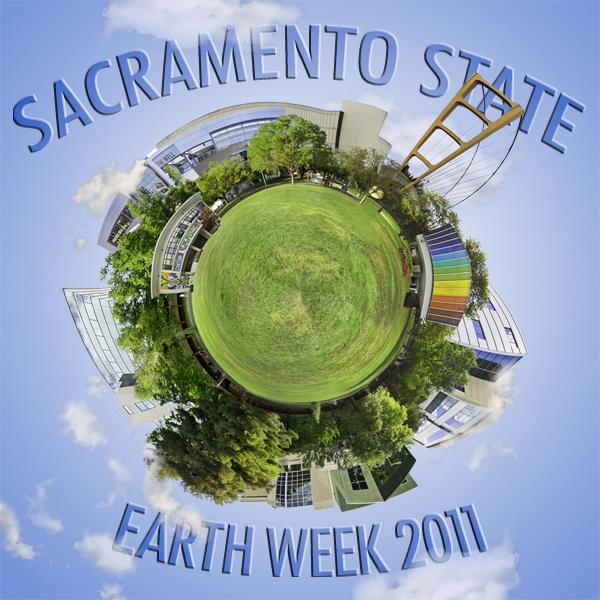Sacramento State Earth Week 2011

April 27, 2011
Environmental Studies department and various other organizations on
campus, the Environmental Student’s Organization planned out this
year’s Earth Week events that led up to Earth Day, which is held
every April 22.
From April 18 until Thursday, Sacramento State students had
opportunities to learn how they can be more environmentally
friendly through lectures, poetry, a documentary and tabling in the
Library Quad.
Professor Michelle Stevens on April 18 lectured on the restoration
of the Iraqi natural marsh system. The marsh system once covered an
area twice the size of the Florida everglades and had its waters
diverted due to dam projects and intentional drainage.
About a dozen vendors from various green industries were in the
Library Quad on April 19, ready to answer questions from the
community and guide them to recycling resources.
The vendors showcased what each business or organization was doing
to help clean up the environment. The vendors showed a need for
proper disposal of items that contain toxic parts, such as
computers and other electronics.
To help with this awareness effort was the California Electronic
Asset Recovery program. The program takes old electronics, or
e-waste, and breaks them down to their basic components, said
program representative Raquel Cloninger.
The company uses a centrifuge along with high-powered magnets to
break apart the electronics safely.
Cloninger said it is essential for electronics to be disposed of
properly.
“It is very important to recycle e-waste, because not everyone
knows that their e-waste has toxic and harmful chemicals like lead
and mercury. We definitely want those products broken down
responsibly,” Cloninger said. “This all done so it will not hit the
landfill and get into the water supply and damage the Earth
further.”
Another company called Clean Tech is helping to find ways of
compacting garbage with the use of solar technology. With their
trash can line called “Big Bellie Solar,” representative Bob Nelson
said the trash can will reduce the number times the trash needs to
be collected.
“The compacting mechanism inside the trash can will compact the
trash to four to five times the volume of regular loose trash. This
will then cut down on the use of vehicles to transfer the trash to
a facility and the manpower needed to round it up,” Nelson
said.
The Environmental Student Organization hosted animal activist Matt
Kimura of the Sea Shepard Conservation Society on April 20. Kimura,
featured on the Animal Planet series “Whale Wars,” talked about how
his group prevents the poaching of whales in the Antarctic Ocean
near a Japanese whaling fleet.
In order for their missions to be successful against the Japanese
whaling fleet, the members aboard the Sea Shepard fleet practice
set routines so they will be prepared for anything, Kimura
said.
“The most interesting thing we do at sea is launch our smaller
single-engine boats at full speed when we plan to engage a whaling
ship. And on any mission, most of the action is directed toward and
at the smaller boats from the larger whaling ships,” Kimura said.
“So what we came up with were specific drills, as we found it took
12 people to pull off our missions correctly.”
To wrap up Earth Week events for the campus, the club hosted a
lecture and documentary for the campus community.
Professor Virginia Matzek presented a lecture titled “10
not-so-simple things you can’t do to save the Earth.” The lecture
centered on the misconceptions about what makes an
environmentalist.
There were no events scheduled for Friday, as that day is
designated as official Earth Day and the campus community was
encouraged to get involved organized Earth Day events around the
city of Sacramento.
“Currently the campus is involved in recycling and composting
programs. But what I am really excited about is the work we are
doing in the residence halls,” Jones said.
The residence halls house 1,700 students and prepare meals for the
residents to consume throughout the day. Jones said the halls have
instituted resource-saving techniques.
“In the dining commons, they have gone to tray-less dining to cut
down on food waste. This in turn cuts down on the amount of dish
detergent being used, which helps with trying to be more green,”
Jones said.
Knowing that it can be difficult to recycle on a regular basis,
senior environmental studies major Laurel Rhodes, president of the
Environmental Student Organization, said there are organizations
willing to help in the effort.
“Recycling is important, but I feel that people think it is a hard
thing to do. And we want to show that it is not hard and there are
resources available to help them do it properly,” Rhodes
said.































































































































